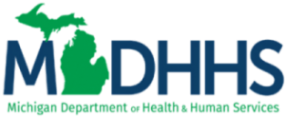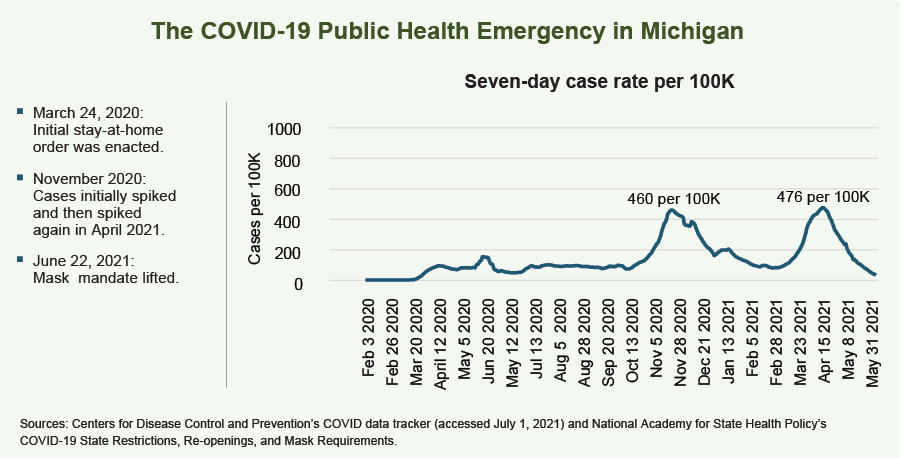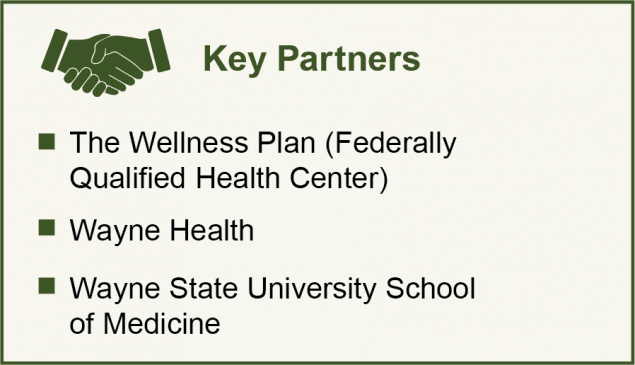Using COVID-19 Testing Sites in Michigan to Expand Access to Cardiovascular Screening
WISEWOMAN Innovation Spotlight

Michigan’s WISEWOMAN program designed an innovative approach that expands WISEWOMAN program access to women outside the traditional health care system by using mobile COVID-19 testing units, which travel to provide testing in different communities. Michigan began implementation at the beginning of the COVID public health emergency in 2020. Figure 1 displays COVID case rates and timing of public health protective measures as important context that influenced the recipient’s program implementation progress.
- 782 women served, including 466 with a complete high blood pressure screening
- 26% of women identify as Hispanic, Black or African American, Asian or Pacific Islander, American Indian or Alaska Native, or multiracial
- 33% of women had hypertension at baseline screening
Source: Mathematica’s analysis of minimum data elements for women with a complete or high blood pressure screening in Years 1 and 2 (September 2018 to September 2020).
Notes: The national WISEWOMAN program defines hypertension as having an average systolic blood pressure of 140 mm Hg or higher, having an average diastolic blood pressure of 90 mm Hg or higher, or taking medication for high blood pressure.
How It Works
Michigan initially planned to use Innovation funds to identify women at salons and beauty parlors for WISEWOMAN services. When salons closed because of the COVID-19 public health emergency (PHE) in March 2020 (see Key Partners box), the recipient pivoted to conducting WISEWOMAN screening at mobile COVID-19 testing units.
Michigan partnered with Wayne State University, which works with Wayne Health, to offer WISEWOMAN screening services out of existing mobile COVID-19 testing and vaccination units.
Currently, eligible women are identified through patient lists from The Wellness Plan, a Federally Qualified Health Center partner. If eligible and interested, a woman can visit a mobile health unit where the staff review WISEWOMAN screening and consent forms and then conduct the WISEWOMAN screening.
After the screening, participants can be referred to a health coach at The Wellness Plan, with whom they work on their health goals.
A lot of [participants] are unemployed women or women that have a problem with income for whatever reason…so I always offer them help if they need it, beyond WISEWOMAN. The women did show up at the screening sites were the women that told me that they really appreciated the fact that I was trying and was willing to help.
Achievements to Date
Trained staff and partners on community screening protocol. Michigan established a community screening protocol for this strategy, providing three trainings to partners at Wayne State University. The Michigan recipient also trained partners at The Wellness Plan.
Increased awareness of and access to WISEWOMAN services. To pilot the new screening process, Michigan first used patient lists from The Wellness Plan to identify eligible participants. The recipient reported that it had identified about 44 women interested in WISEWOMAN through these lists; 12 of those women attended WISEWOMAN screenings at a mobile unit.
Figure 1. The COVID-19 Public Health Emergency in Michigan, February 2020 to May 2021

This graph titled The COVID-19 Public Health Emergency in Michigan, is charting the seven-day case rate per 100 thousand people, February 3, 2020, through May 31, 2021. The case rate remained at zero from February 3 to March 20, 2020. An initial stay at home order was enacted on March 24. Case rates began rising after March 20, reaching nearly 200 per 100 thousand people by June, then dropped off slightly to around 100 through October. Beginning in October, rates climbed sharply spiking at 460 per 100 thousand by November. Case rates dropped off again, reaching around 100 by February 28, 2021, then spiked again in April at 476 before dropping off to nearly zero by May 31. The mask mandate in Michigan was lifted on June 22, 2021. Sources: Centers for Disease Control and Prevention’s COVID data tracker (accessed July 1, 2021) and National Academy for State Health Policy’s COVID-19 State Restrictions, Re-openings, and Mask Requirements.
Related Resources
Other Organizations
- The Wellness Plan Medical Centers (Federally Qualified Health Center)
- Wayne Healthcare
- Wayne State University School of Medicine
References
- Centers for Disease Control and Prevention. COVID Data Tracker. Atlanta, GA: U.S. Department of Health and Human Services, CDC. Accessed July 1, 2021.
- National Academy for State Health Policy. 2020 COVID-19 State Restrictions, Re-openings, and Mask Requirements. Accessed July 1, 2021.

